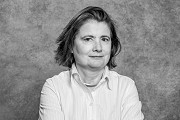Participants
Florin Turcanu2; Daniela Zaharia2; Blazej Brzostek1; Sophie Coeuré4; Stanislav Sretenovic3; 1 University of Warsaw, Poland; 2 University of Bucharest, Romania; 3 Institute for contemporary history, Serbia; 4 Université de Paris, FranceDiscussion
The mission of historiography and historians is traditionally perceived within the framework of an endeavour that documents, analyses, interprets, and informs about past social dynamics and processes. In the 20th century, however, Eastern European societies went through multiple political changes in a relatively short time and at a very rapid pace. In most of these countries, a single generation was able to witness and be actors in the formation of nation-states after the First World War, the establishment of dictatorships in the 1930s, the traumatic and profoundly transformative period of the Second World War, the forced entry into the communist regime and the Soviet bloc, the Cold War, the internal developments of the various communist regimes, and in 1989-1990, they were still present at the collapse of communism. In this condensed history, from one political period to another, historians have been confronted with or have themselves provoked a complex interplay between historiography, ideology, and public memory.
Historians have produced narratives and arguments in support of political extremism, have reformulated entire historiographical theories to adapt them to Marxist concepts, or conversely, have been active agents in instilling historical visions that compete with Marxism at various stages of communist history, and have been involved in the convulsions of the post-communist transition. An essential characteristic of these roles, which differentiates the historiography of Eastern European communist countries from that produced in democratic societies, is the interplay with state politics and its direct interference in historical discourse. This often positions historians in a dichotomy between historiographical propaganda and the pursuit of methodological modernisation and critical deconstruction of historical manipulation.
We propose a round table on historiography as a field of intellectual and ideological disruption during the communist and post-communist eras, including a variety of mechanisms and aspects: - The history policies practiced by communist regimes, and the ideological transformations within these regimes as factors of discontinuity in discourse and historiographical production. - Reinterpretation, avoidance, or introduction into historiographical analysis of challenging topics, primarily the Holocaust, the history and assessment of national fascisms, and the political repression during communism. - The function of historians in the social metabolism of of the memorial wave confronting Eastern European countries over the history of World War II and the history of communism. - The emergence of "dissident" or "non-conformist" historians and their journey from being marginal figures in the intellectual field to the status of public intellectuals. 

